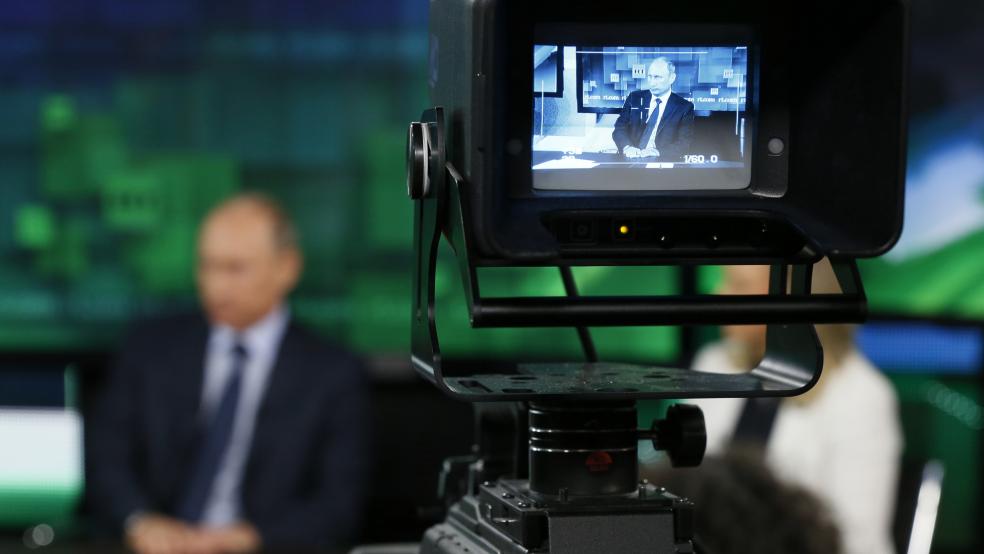In March, as the Ukraine crisis escalated and Russia secured its grip on Crimea, Liz Wahl, an anchor on state-funded television station Russia Today (also known as RT), had enough. On live TV, she quit.
She began her resignation by telling the world about her family, which fled from Hungary in 1956 and out of the reach of the Soviet Union. She also said that as the daughter of a veteran, and the partner of someone who works with the U.S. military, she could no longer work for RT.
Related: Russia Can Lose Territory, Too. It Should Worry
“That is why, personally, I cannot be part of a network funded by the Russian government that whitewashes the actions of Putin," Wahl said, referring to Russian President Vladimir Putin. "I'm proud to be an American and believe in disseminating the truth. And that is why, after this newscast, I'm resigning."
RT dismissed Wahl’s resignation as a publicity stunt. “When a journalist disagrees with the editorial position of his or her organization, the usual course of action is to address those grievances with the editor, and, if they cannot be resolved, to quit like a professional,” the network said in a statement. "But when someone makes a big public show of a personal decision, it is nothing more than a self-promotional stunt.”
Whatever the case, the incident of a few months ago drew renewed attention to the power of Russian-state media. Russia has always controlled the media at home; journalists who oppose Putin are routinely harassed, and some have been killed under mysterious circumstances.
RT and its subsidiary Ruptly, a video distribution service based in Berlin, represent the Kremlin’s boldest attempt to shape the international narrative. Each service has reporters around the world, and publicly presents itself as fair and impartial.
Related: Russia’s Military Bear Is a Paper Tiger
This just isn’t the case. News reported by RT has a definite pro-Russia slant and ignores reality on the ground. This is most evident in the organization’s coverage of the crisis in Ukraine, which has been nothing short of Russian propaganda.
Headlines from this coverage included a description of Russia as a “stabilizing force for Ukraine.” RT anchors recited - word for word - the same monologue about Russia’s importance in Crimea. It reported that Ukraine was recruiting terrorists to help fight pro-Russia separatists.
The best RT headline is in a story that describes Russia’s presence in Crimea as a good thing. The article, entitled “Tea, sandwiches, music, photos with self-defense forces mark peaceful Sunday in Simferopol,” features pictures of smiling Crimeans with Russian soldiers. In one photo, a young woman in heels stands next to a group of Russian soldiers. It’s captioned, “The question of what's more dangerous in close combat - high heels or a machine gun - remains open.”
Growing Force
It would be easy to dismiss RT as farce if its influence weren’t growing. During the crisis in Ukraine, RT was able to provide a narrative that those inclined to side with Russia could easily accept. This didn’t happen in the U.S. – but it did in Europe.
Related: Putin’s Rise Highlights U.S. Descent from Global Stage
State-run television news stations in Europe are common. In Germany, Deutsche Welle airs objective world news. France 24 does the same in France, as does Rai News 24 in Italy.
These stations run alongside CNN International and the BBC. They’re generally accepted as non-partisan sources of news. This gives RT an advantage in Europe: RT is granted legitimacy because other national stations are accepted as legitimate.
This is especially true in Germany, where sympathies toward Russia run high. Public opinion there is split on whether Putin or President Obama is more of a danger to world stability. RT provides a narrative that Germans sympathetic to Moscow can buy in to.
In Europe, RT is available to 120 million households; it's the most watched English language news channel in the U.K., according to British marketing agency Kantar Media. In the U.S., RT is available to 85 million households and is the most watched foreign news network here.
U.S. Falling Behind
During the Cold War, the United States used Radio Free Europe to provide objective news to those behind the Iron Curtain. But the importance of RFE has dwindled since the Berlin Wall fell, leaving the U.S. with few avenues to combat Putin’s propaganda.
USAID has attempted to combat Russia’s constant stream of biased information with a $1.25 million grant to Ukrainian news organizations. George Soros’ International Renaissance Foundation has also worked to get objective news to Ukrainians.
For its part, RT and Ruptly are unapologetic. They both contend that their news provides an alternative to news with a western bias.
“There's large demand for media that doesn't just parrot the uniform pulp from the Western press," Margarita Simonyan, editor in chief of RT, told German media. “We're something along the lines of Russia's Information Defense Ministry.”
This article was updated at 9:20 a.m. on June 1, 2014.
Top Reads from The Fiscal Times:





